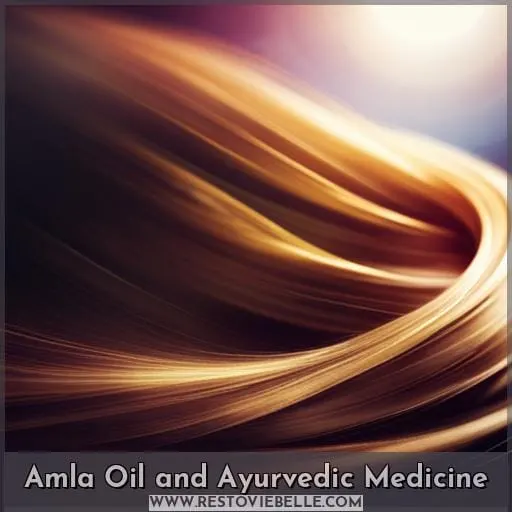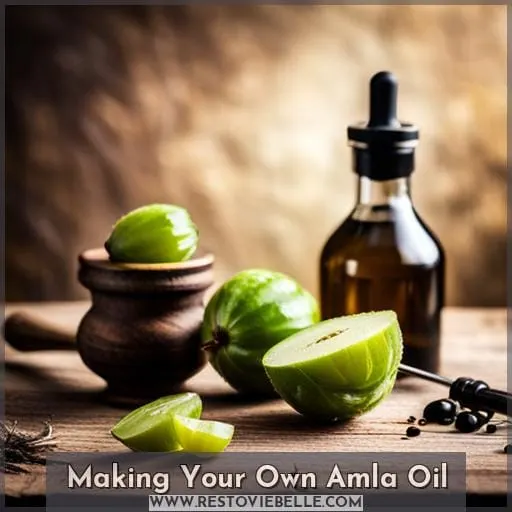This site is supported by our readers. We may earn a commission, at no cost to you, if you purchase through links.
 Imagine a crown of lustrous, thick hair, a symbol of vitality and confidence.
Imagine a crown of lustrous, thick hair, a symbol of vitality and confidence.
Amla oil, a gift from nature, may hold the key to unlocking your hair’s true potential.
Journey with us as we explore the truth behind this ancient remedy, separating myth from reality.
Amla oil: Elixir of hair growth or a mere tale?
Let’s unravel the truth together.
Table Of Contents
- Key Takeaways
- What is Amla Oil?
- Amla Oil and Ayurvedic Medicine
- Using Amla Oil for Hair Health
- Does Amla Oil Promote Hair Growth?
- Making Your Own Amla Oil
- Purchasing Pre-Made Amla Oil
- Applying Amla Oil to Your Hair
- Safety Profile of Amla Oil
- Side Effects and Precautions
- Frequently Asked Questions (FAQs)
- Can amla oil be combined with other oils or hair care products for enhanced results?
- How long should amla oil be left in the hair before rinsing for optimal scalp absorption?
- Are there any dietary changes or lifestyle modifications that can be made alongside using amla oil to improve hair health?
- Can amla oil be used on color-treated or chemically processed hair without causing damage?
- What is the recommended frequency of amla oil application to maintain healthy hair and prevent hair loss?
- Conclusion
Key Takeaways
- Amla oil, derived from the Indian gooseberry tree, is a natural remedy infused with vitamin C and antioxidants.
- In Ayurvedic medicine, amla oil has been traditionally used to nourish hair, stimulate scalp circulation, strengthen hair follicles, prevent premature graying, and balance the body’s doshas.
- Amla oil can be applied to the scalp and hair, left on for 1-2 hours or overnight, and then rinsed out with a mild shampoo.
- While some animal studies suggest that amla oil may inhibit 5-alpha-reductase and promote hair growth, more human research is needed to fully understand its efficacy.
What is Amla Oil?
You’re looking at a natural remedy derived from the Indian gooseberry tree, a rich source of vitamin C and antioxidants.
Amla oil, a staple in Ayurvedic medicine for centuries, isn’t just another hair oil; it’s a liquid embodiment of nature’s healing wisdom.
This oil, extracted from dried amla fruits soaked in nourishing oils like coconut or sesame, carries a legacy of therapeutic traditions.
Its cultural significance is interwoven with ancient practices, where it’s revered for its ability to revitalize hair and promote overall well-being.
Discover the secrets of amla oil, a natural elixir for hair growth and overall health, steeped in tradition and backed by modern research.
Amla Oil and Ayurvedic Medicine
In traditional Ayurvedic practice, you’ve counted on amla oil for centuries to nourish and rejuvenate your hair.
Ayurvedic medicine is rooted in ancient Indian wisdom and focuses on balancing the body, mind, and spirit.
Amla oil holds great significance within this holistic approach due to its therapeutic traditions and cultural importance.
Historically, amla oil has been used as an essential component of Ayurvedic treatments for various ailments.
It’s believed to promote hair growth by stimulating the scalp’s blood circulation, strengthening the hair follicles, and preventing premature graying.
One key reason why amla oil is highly regarded in Ayurvedic medicine is its rich nutritional benefits.
This natural elixir contains high levels of vitamin C—a potent antioxidant known for promoting collagen production—and other essential nutrients that nourish both your scalp and hair strands.
Moreover, Ayurvedic principles emphasize balance within the body’s doshas (energies) and believe that imbalances can lead to health issues like Androgenetic alopecia or male pattern baldness.
Accordingly, the use of herbal remedies such as amla oil aims at restoring this equilibrium through external application, facilitating optimal conditions for healthy hair regrowth.
Overall, Ayurveda recognizes Amla Oil not only as an effective remedy but also acknowledges its historical context, cultural significance, and nutritional value.
The combination of these factors makes it clear why amla oil continues to remain highly valued in Ayurvedic practices when seeking out solutions related to healthier, stronger, and more lustrous locks.
Using Amla Oil for Hair Health
Amla oil’s prominence in Ayurvedic medicine for hair health has led you to consider its potential benefits for your own hair.
You’re drawn to its natural ingredients and rich history, and you’re eager to explore how it can transform your hair care routine.
Whether you choose to make your own amla oil or purchase pre-made products, you’ll embark on a journey of scalp massages, DIY recipes, and amla infusions.
You’ll discover the cultural practices that have made amla oil a staple in hair care for centuries, and you’ll witness the transformative power of vitamin C and antioxidants on your scalp and hair.
Does Amla Oil Promote Hair Growth?
You’ve heard the buzz about amla oil’s hair-growing prowess, but does it live up to the hype?
Animal studies suggest it inhibits an enzyme linked to baldness.
However, human research is lacking.
Let’s dig deeper to uncover the truth about amla oil’s hair-growing abilities.
Animal Studies
Lab studies using animals have revealed amla oil’s potential to inhibit 5-alpha-reductase, an enzyme linked to hair loss.
Discover how amla oil combats hair parasites, stimulating fur growth in rabbits and rats.
Dive into Pakistani research unveiling amla oil’s hair growth-promoting effects in mammals.
Unleash the power of amla oil to reclaim your crowning glory.
Human Research
You’ve probably read about human studies examining Amla oil’s effects on hair growth.
While there’s some evidence to suggest that Amla oil may promote hair growth due to its high vitamin C content and antioxidant properties, more research is needed to fully understand its efficacy.
Clinical trials, user experiences, dermatologist insights, expert opinions, and comparative studies can provide valuable information in determining the true potential of Amla oil for stimulating hair growth.
Making Your Own Amla Oil
Before purchasing, you can try making your own amla oil.
Use dried amla fruit and a carrier oil.
Extract the juice from the amla fruit or grate it finely.
Mix the juice or grated amla with a tablespoon of your preferred carrier oil, such as coconut, olive, or sesame oil.
Blend until you achieve a uniform consistency.
If using solid oils, gently heat the mixture until the oil melts.
Apply the amla oil to your scalp and hair, massaging it gently.
Leave it on for an hour or two, or even overnight for deeper conditioning.
Rinse your hair thoroughly with a mild shampoo.
Store your homemade amla oil in a glass jar in a cool, dark place to maintain its freshness and potency.
Purchasing Pre-Made Amla Oil
When buying pre-made amla oil:
- Look for brands that provide information about the concentration of the oil. Higher concentrations will yield stronger results.
- Check the ingredient list to ensure the oil is pure and free from additives or fillers.
- Reading user reviews can give you valuable insights into the quality and effectiveness of the product.
To choose the best amla oil for your needs:
- Compare brands: Research different brands to compare their quality standards, ingredient sourcing, and customer reviews. Choose a brand that aligns with your values and hair care needs.
- Ingredient verification: Scrutinize the ingredient list for quality and purity. Avoid products with added fragrances, dyes, or harsh chemicals that could irritate your scalp.
To use amla oil effectively:
- Application techniques: Explore various application techniques to find what works best for you. You can apply amla oil directly to your scalp, mix it with other hair care products, or create a hair mask. Experiment to discover the optimal method for your hair type and desired results.
Applying Amla Oil to Your Hair
After purchasing pre-made amla oil, you can apply it to your hair for potential hair health benefits.
Begin by sectioning your hair and applying a generous amount of oil to your scalp.
Use your fingertips to massage it in, promoting blood circulation and allowing the oil to penetrate.
Extend the oil to the lengths of your hair, ensuring even distribution.
For deeper conditioning, wrap your hair in a warm towel or shower cap and leave it overnight.
Alternatively, you can mix amla oil with other hair-friendly ingredients like coconut or castor oil to create a potent DIY blend.
Experiment with different application methods and frequency to find what works best for your hair.
You can use amla oil as a pre-shampoo treatment or add a few drops to your shampoo for a boost of nourishment.
Safety Profile of Amla Oil
Let’s now turn our attention to the safety profile of amla oil when used for hair care.
Amla oil is typically safe for topical use, but some individuals may experience allergic reactions or scalp irritation.
If you have sensitive skin, it’s best to do a patch test before applying amla oil to your scalp. Start with a small amount and gradually increase the dosage as your scalp adjusts.
There are no established dosage recommendations for amla oil, so it’s crucial to follow the instructions on the product label.
Long-term effects of amla oil use haven’t been extensively studied, so it’s wise to use it judiciously and monitor your scalp’s response.
If you experience any adverse effects, discontinue use and consult a healthcare professional.
While amla oil is generally safe, it’s essential to be aware of potential interactions with medications, particularly antidiabetic agents and anticoagulants.
Consult your doctor before using amla oil if you’re taking any medications.
Side Effects and Precautions
Consider any potential side effects before using amla oil, especially if you’re pregnant or taking medications.
Interactions with antidiabetic agents and anticoagulants are possible, so consult your doctor first.
Pregnancy
During pregnancy, avoid amla oil due to insufficient safety data.
Its effects on fetal development are unknown.
Nursing mothers should also exercise caution, as the oil’s components may pass through breast milk.
Amla oil’s safety for children is also unclear, so it’s best to avoid it.
Long-term use hasn’t been studied, so potential risks are unknown.
If you’re pregnant, nursing, or have concerns, consult your doctor before using amla oil.
Medication Interactions
Consulting your doctor before using amla oil is vital if you’re taking medications.
Amla oil may interact with certain drugs, including antidiabetic agents and anticoagulants, potentially causing adverse effects.
Additionally, combining amla oil with other herbal remedies or supplements without consulting a healthcare professional can lead to unforeseen contraindications.
Prioritize your safety by discussing potential drug interactions and alternative therapies with your doctor before incorporating amla oil into your routine.
Frequently Asked Questions (FAQs)
Can amla oil be combined with other oils or hair care products for enhanced results?
Unlock the full potential of your hair’s growth journey.
Harmonize amla oil with other hair-loving allies.
Unleash the synergy of natural ingredients to awaken dormant follicles.
Unveil your crowning glory’s fullest expression.
How long should amla oil be left in the hair before rinsing for optimal scalp absorption?
For optimal scalp absorption, leave amla oil in your hair for at least 1-2 hours, or overnight.
This allows the nutrients to penetrate deeply and nourish your scalp, promoting healthy hair growth.
Are there any dietary changes or lifestyle modifications that can be made alongside using amla oil to improve hair health?
To unlock your hair’s fullest potential, embrace a holistic approach.
Supplement your amla oil routine with a balanced diet rich in vitamins, minerals, and antioxidants.
Regular exercise and stress reduction can also work wonders for your crowning glory.
Can amla oil be used on color-treated or chemically processed hair without causing damage?
Enhance your crowning glory without compromise.
Amla oil’s gentle touch won’t harm your chemically treated tresses.
Embrace your vibrant locks, knowing they’re nourished and protected.
What is the recommended frequency of amla oil application to maintain healthy hair and prevent hair loss?
To maintain healthy hair and prevent hair loss:
Incorporate amla oil into your hair care routine.
Regular use nourishes your scalp, strengthens strands, and promotes growth.
Experience the power of nature’s remedy for luscious locks.
Conclusion
Like a phoenix rising from the ashes, your hair can experience a rebirth with amla oil.
While research is still ongoing, anecdotal evidence and preliminary studies suggest that this ancient remedy may hold the key to unlocking your hair’s full potential.
Embrace the wisdom of Ayurveda and incorporate amla oil into your hair care routine.
With patience and consistency, you may find yourself with a crown of lustrous, thick hair that radiates health and vitality.














